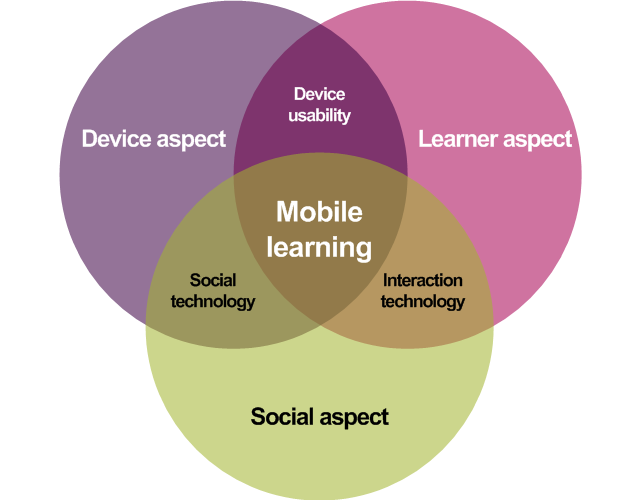In order to move from academic theorising about mobile learning to operational and successful use frameworks are necessary. There are a variety of such frameworks and, before introducing several which educational institutions may find useful, it is worth recapping a Futurelab overview from 2004 outlining six broad theory-based categories of activity. Knowing what it is that’s driving the change you want to see enables successful evaluation of mobile learning initiatives:
- Behaviourist - activities that promote learning as a change in learners' observable actions
- Constructivist - activities in which learners actively construct new ideas or concepts based on both their previous and current knowledge
- Situated - activities that promote learning within an authentic context and culture
- Collaborative - activities that promote learning through social interaction
- Informal and lifelong - activities that support learning outside a dedicated learning environment
and formal curriculum
- Learning and teaching support - activities that assist in the coordination of learners and resources for learning activities.
Whilst some initiatives may see mobile learning as a way to foster collaborative interactions, others may foreground more behaviourist approaches. It is possible, of course, to blend several categories of activity (although this may make the initiative more difficult to evaluate).
Laurillard (2002) - A Conversational framework for the effective use of learning technologies
For categories of activity that can be described as Constructivist, Situated, Collaborative and/or Informal, Laurillard’s Conversational Framework may be appropriate:

The main roles of mobile technology in supporting the ‘conversational learning’ promoted by Laurillard are therefore:
- providing an environment to enable conversation
- enabling learners to build models in order to solve problems
Whereas previous applications of Laurillard’s framework may have been static and, perhaps, VLE-based, mobile learning enables this type of learning to be both technology-mediated and contextual. For more on Laurillard’s Conversational Framework, please see her book Rethinking University Teaching.
Park (2011) - Pedagogical Framework for Mobile Learning
For those institutions looking for an alternative focus, Park’s (2011) pedagogical framework for mobile learning is a way of understanding how ‘transactional distance’ and the ‘social’ nature of an activity can be mapped against one another. The former is defined as the ‘cognitive space’ between individuals whereas the latter is to what extent an activity involves interaction with others in order to be completed successfully:

Park’s pedagogical framework allows academics and institutions to plan for the type of learning and teaching experiences that may work well in their particular context. Park gives each element a code - with H standing for high transactional distance, L for low transactional distance, S for high social interaction and I for low social interaction.
An HS approach, for example, allows for high transactional distance and high social interaction with peers. This can be appropriate at any level of education, but may be more appropriate with learners who already have expertise in a given area. An LI approach, on the other hand, would be closer to a traditional experience for learners, with highly-structured and with (mostly) individual interaction with a single instructor.
Koole - A Model for Framing Mobile Learning (2009)
A more holistic framework for mobile learning comes with Koole’s FRAME model. This consists of a three-circle Venn diagram comprising the Learner aspect (L), the Social aspect (S) and the Device aspect (D). Taking two or more of these together at the point at which the circles overlap in the Venn diagram:

Koole provides criteria for each of the sections:
- Device Aspect
- Learner Aspect
- Social Aspect
- Device Usability
- Interaction Technology
- Social Technology
- Mobile Learning
Mobile learning provides enhanced collaboration among learners, access to information, and a deeper contextualization of learning. Hypothetically, effective mobile learning can empower learners by enabling them to better assess and select relevant information, redefine their goals, and reconsider their understanding of concepts within a shifting and growing frame of reference (the information context).
Koole (2009)
Mobile learning is therefore a combination of the interactions between learners, their devices, and other people. Koole also provides a helpful checklist for institutions looking to adopt mobile learning, including the following questions.
In a mobile learning system, have you considered:
- how use of mobile devices might change the process of interaction between learners, communities, and systems?
- how learners may most effectively use mobile access to other learners, systems, and devices to recognize and evaluate information and processes to achieve their goals?
- how learners can become more independent in navigating through and filtering information?
- how the roles of teachers and learners will change and how to prepare them for that change?
These questions enable the mobility of the learner rather than the device to be at the forefront of the mobile learning initiative.
References
- Futurelab (2004) Mobile Technologies and Learning report
- Koole, M.L. (2009) 'A Model for Framing Mobile Learning', in Ally, M. (ed.), Mobile Learning: Transforming the Delivery of Education and Training, Edmonton, 2009, p.38)
- Park, Y. (2011) 'A Pedagogical Framework for Mobile Learning: Categorizing Educational Applications of Mobile Technologies into Four Types' (The International Review of Research in Open and Distance Learning, 12(2), February 2011)
- Wingkvist, A. & Ericsson, M. (2010) 'A Framework to Guide and Structure the Development Process of Mobile Learning Initiatives' (in Montebello, M., et al. mLearn 2010: Conference Proceedings, 2010)